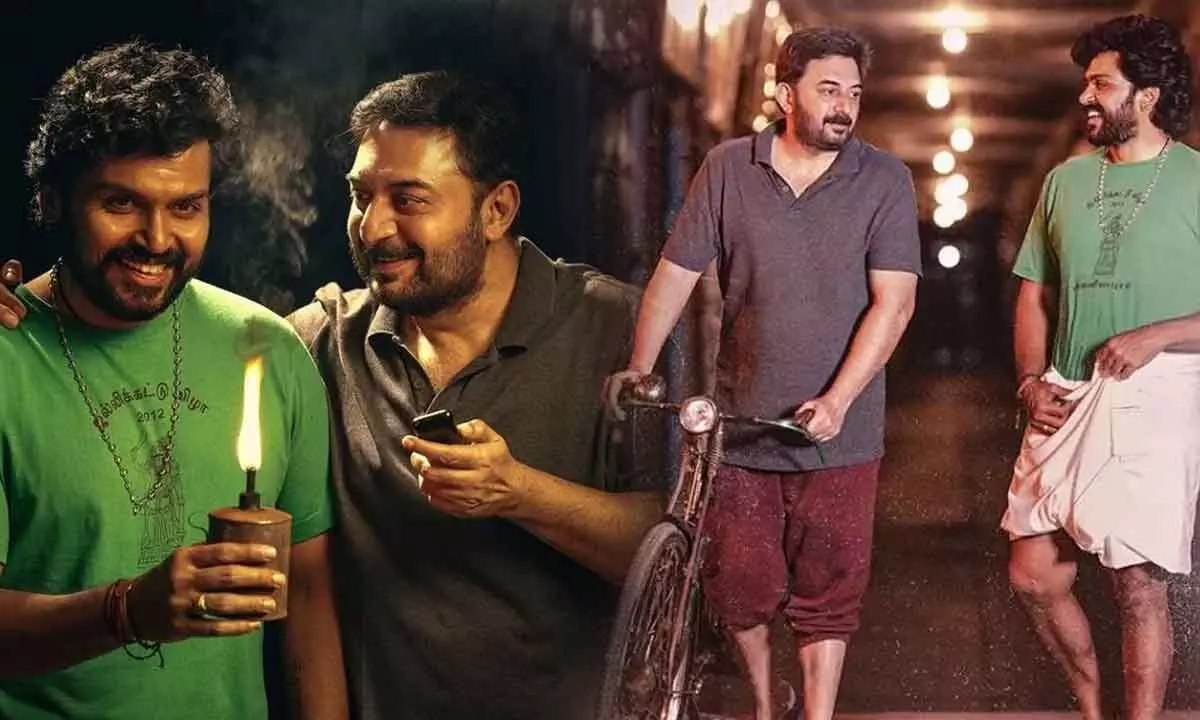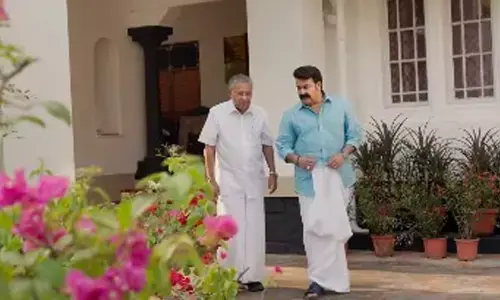Satyam Sundaram: A Thoughtful Reflection on Family and Forgiveness

Satyam Sundaram, directed by Prem Kumar, presents a heartfelt exploration of family relationships, childhood memories, and the complexities of forgiveness.
Satyam Sundaram, directed by Prem Kumar, presents a heartfelt exploration of family relationships, childhood memories, and the complexities of forgiveness. With a cast led by Karthi and Arvind Swamy, the film takes the audience on an emotional journey that is both relatable and engaging.
Story
The story of Satyam Sundaram revolves around Satya, played by Arvind Swamy, who returns to his native village after 20 years for his sister's wedding. Years ago, due to unresolved family disputes, Satya and his entire family were forced to leave their ancestral home and relocate elsewhere. Since then, they have never returned to the village, deeply hurt by the past.
Now, after all these years, Satya comes back for his sister's wedding. As events unfold in the village, Satya meets a new person. But the question arises—who is this individual? Is this person truly new in Satya’s life, or someone from his past? The story explores the changes that occur in Satya’s life after his return, and what happens in Sundaram’s life thereafter.
Performances
Karthi and Aravind Swamy's are thoughtful and grounded. Aravind Swamy effectively conveys the inner conflict of a man torn between his past and present, offering a layered performance that brings depth to the character. His role as a man trying to heal old wounds is handled with sensitivity. Karthi compliments him, as a pure soul, with a performance that balances emotional restraint with vulnerability.
The supporting cast, including Divyadarshini, Jayaprakash, and Sri Divya, the actress who played "maradalu" of Aravind Swamy too contribute well to the film’s emotional core, with their performances adding warmth and humour to the story. Each actor fits naturally into their role, creating a sense of authenticity in their interactions.
Technicalities
Visually, Satyam Sundaram captures the rural landscape with a focus on natural beauty. The setting of the village, combined with the film’s aesthetic choices, enhances the nostalgic feel of the story.
Prem Kumar’s direction maintains a steady pace, ensuring that the story unfolds in a way that allows the characters to develop without feeling rushed. The film’s music, composed by Govind Vasantha supports the emotional narrative, adding subtle layers to the story without overpowering the scenes. Rakendu Mouli brought the beautiful flavour of Telugu onto this Tamil movie, doesn't even feel the difference of language anywhere.
Analysis
Satya Sundaram is a philosophical film that combines comedy and heart-touching moments. It resonates with memories of our childhood days, the times spent with relatives, and the atmosphere. The story reflects the common disputes that arise within families, a reality in many households. These conflicts often affect children deeply, causing mental distress and leading to significant changes in their lives. This theme is explored thoughtfully in the movie, showing how life can take unexpected turns, leaving a person vulnerable yet inwardly holding onto pain.
It offers a reflective look at family dynamics, emphasising the importance of forgiveness and reconnecting with one’s roots. The film illustrates how unresolved issues from the past can influence the present, and how returning to one’s origins can provide an opportunity for personal reconciliation.
The movie portrays how difficult it is to forgive, emphasizing the emotional journey one goes through before finally letting go. It shows the pain and hardship experienced when someone is forced to leave their home, their village, and the surroundings they once cherished. The film explores what it means to return to one’s roots and the complex feelings associated with it. Through Satya’s journey, it delves into the changes in his life and how forgiving and moving on can bring about inner peace.
The movie also reflects on the universal experiences of childhood—learning to ride a bicycle for the first time, spending summer vacations at relatives’ homes, early life lessons are woven into the narrative, creating a sense of shared experience that many viewers may relate to. These common experiences are captured beautifully, making the story highly relatable. Sundaram’s character, in particular, stands out as someone who never harbours ill feelings. The film’s exploration of these themes feels both personal and universal, making it a thoughtful piece of storytelling.
Satya’s approach to life, one of understanding and acceptance, reflects the film’s overarching message of forgiveness as a path to peace.
Prem's direction is skillful in balancing comedy and emotional depth. The flow of the story is smooth, like a stream that nourishes everything around it, providing happiness to everyone. The film uses suitable background music (BGM) to enhance the storytelling, making it a heartwarming experience. There are no significant negatives in the film. The director skillfully chooses when to show or hint at events from the past and when to reveal the present. The scenes are well-crafted, with moments that make the audience laugh, while others are deeply touching.
Rekendu Mouli's Telugu writing is heartfelt, with touching dialogues and songs that complement the narrative. Even the supporting characters, like Arvind Swamy’s sister and the girl playing the bride, contribute meaningfully to the story. The wedding scenes, as well as those involving Arvind Swamy’s uncle and cousins, are handled beautifully, adding emotional depth to the movie.
Satyam Sundaram is a balanced film, offering a blend of emotion, nostalgia, and philosophical insight. The performances by Karthi and Arvind Swamy, Sri Divya combined with the thoughtful direction and strong technical elements, make it a film worth watching. Its gentle exploration of family relationships and forgiveness leaves a lasting impression.











